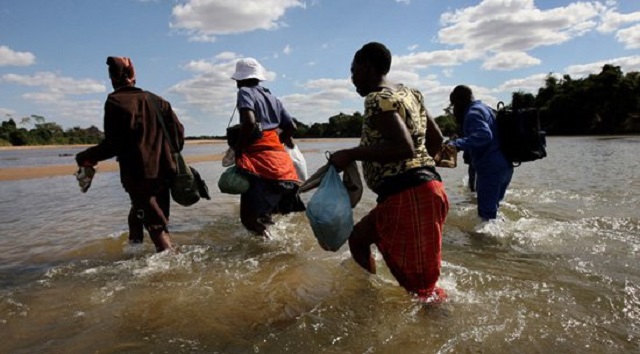EDITORIAL COMMENT: Harare must emulate Bulawayo in typhoid fight

At the last count on Friday, two people had died of typhoid in Harare, after 250 suspected cases were reported and 22 confirmed in that city.
The outbreak of the potentially fatal disease has prompted the Government to form an inter-ministerial committee to look at ways to get it under control.
The Minister of Health and Child Care Dr David Parirenyatwa, Minister of Local Government, Public Works and National Housing Saviour Kasukuwere, who also represented the Ministry of Environment, Water and Climate and the Mayor of Harare Councillor Bernard Manyenyeni form the ministerial taskforce.
The disease occurs in environments where water and sanitation systems are poor. Many high density suburbs in Harare, particularly Mbare, are very dirty. The local authority is failing to collect garbage as regularly as it must. Water taps are dry for extended periods in the suburbs. Where and when they aren’t, they discharge water that is contaminated, in many cases, with feacal matter. Some people drink it regardless. Toilets are often clogged up as there is seldom any running water to move excrement. Add the prevailing rainy conditions, you get the best conditions for typhoid to strike, and cholera as well.
Because it is associated with dirtiness, typhoid is one disease that we feel must never be reported in our country, especially in Harare and other urban centres which are run by local authorities that collect rates that should be invested for cleaner environments.
Typhoid is an infectious disease of the intestines that is caused by bacteria salmonella typhi. Signs and symptoms of typhoid usually appear after one to three weeks after exposure and may be mild or severe. The symptoms include poor appetite, abdominal pain, headaches, generalised aches and pains, fever, intestinal bleeding or perforation (after two to three weeks of the disease), diarrhoea or constipation, enlarged spleen or liver and rose coloured spot on chest among other signs.
The disease is primarily transmitted through the faeco oral route (the faeces of the infected person indirectly contaminating food or water).
Drinking water that has come into contact with sewage can also cause the disease.
To help contain the typhoid outbreak, the interministerial committee banned vending of fruits and vegetables as well as urged residents to uphold high hygienic standards.
“We have agreed to prohibit and stop the vending of food be it processed or unprocessed in undesignated areas in the City of Harare and other cities in Zimbabwe, to control the spread of typhoid and all people interested in vending should approach the City of Harare for appropriate allocation of vending space,” Dr Parirenyatwa said.
“The residents are encouraged to desist from littering or dumping waste and rubbish in open spaces to avoid the spread of typhoid, cholera and other diarrhoeal diseases, but to use designated areas and bins. The City of Harare is instituting 24-hour refuse collection within the CBD and in other areas a 16 hour shift is to be carried out while a 12-hour shift will be done in some areas. They are also clearing drainages to allow free rain water to flow.
“The cleaning and clearance of illegal dumpsites is ongoing in all the high density suburbs of Harare including Mbare where typhoid has been reported and plans are in place to complete clearance of Mbare dumpsites by Friday [last week].”
He encouraged people to wash hands with soap under running water before handling or eating food and to boil all drinking water. They must also seek treatment early at their nearest health facility when they are presented with signs and symptoms of typhoid, cholera and other diarrhoeal diseases, he said.
Our people, not only those in Harare need to take this advice.
Harare City Council has for decades been accused of doing little to ensure that they pump sufficient and potable water to homes or collect rubbish. Bulawayo residents might be shocked to learn that many in Harare actually dig shallow wells in their small yards from which they draw water for domestic use. The residents resort to such desperate measures because council actually fails to provide the resource, not because Harare’s water supply dams are dry but because the city lacks the right infrastructure to distribute it.
We demand that Harare City Council gets more serious in delivering the right services to residents instead of wasting time, money and energy in silly political fights and wasting ratepayers’ money on hefty salaries.
That council must find ways to invest in water distribution infrastructure so that it pumps drinkable water to homes, more regularly. The council must also invest in rubbish collection machinery and vehicles so that it is able to clean up the city at regular intervals.
The cleanliness that we expect in Harare and other urban areas is not to prevent disease outbreaks only, but to also enhance the aesthetic beauty of the physical environment.
While no cases have been reported in Bulawayo, there is no need for anyone to feel too safe. Eight suspected cases were reported last week at Mpilo Central Hospital and Galen House, but all turned negative.
That is encouraging for a city that actually does not have enough water to provide residents unlike Harare which has plenty of if but does not have capacity to deliver it. For about two months, Bulawayo City Council ran a 72-hour water shedding programme after its dam levels had dropped to around 30 percent. This water conservation strategy is implemented frequently in the water-insecure city, but even in those periods, no typhoid cases are ever reported.
Harare City Council might want to learn a thing or two from Bulawayo City Council, how it manages its limited water and ensuring that it remains potable.










Comments